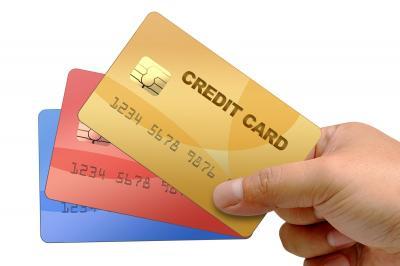When I brought a maxi dress, desk lamps, baby gifts and pair of shoes to the counter at TJ Maxx, I knew I’d get a hard sell for a store credit card. It would give me 10% off my purchase, or about $15 in savings, and I could get rewards on future purchases as well. And I shop at TJ Maxx a lot, right? So imagine “saving” money again and again as I return to the store.
The daydream, led by the friendly sales associate behind the counter, lasted a few seconds. But I quickly snapped out of it and replied, “No, thank you.” Luckily this associate was obliging, but I’ve been to other stores who clearly train their salespeople in high level negotiating tactics (I’m looking at you, Boscovs and Tablots. I get the hard sell there, big time). The back-and-forth can be enough to convince almost any customer to sign up for the company credit card. But store plastic is a bad idea for your financial health, and here’s why.

Interest Rates
First of all, unless you have the willpower to pay off the credit card immediately and in full every month, you will be subject to insanely high interest rates. That TJ Maxx card has a variable APR of 26.99%. So if I use the $150 purchase I mentioned above as an example, and only paid off the $15 minimum each month, it would take me a whole year to pay off the debt, with about $22 in interest. So there goes the “savings” I enjoyed off my first purchase. Therein lies the problem: we get hooked on a card because we are told we will save money, but retail stores aren’t charities. Any savings or coupons are offset by interest payments or increased spending.
It Could Affect Your Credit Score
Secondly, any time you open a new credit card, the company runs a report on your credit history. This report will impact your credit score, as the rating agencies recognize that you are taking on more risk. Let’s say before you open retail cards, you have one credit card from your local bank with a $10,000 limit. Then you open cards at Gap, Victoria’s Secret and Macy’s, each with a $5,000 limit. The credit ranking agencies don’t think about the awesome coupon books you will receive or the notifications of sales. Instead, they see that you’ve just increased your potential debt load from $10,000 to $25,000. That is a 150% increase in debt that you could take on any day. Also, those who carry multiple store credit cards are viewed as riskier borrowers, so if you do want new lines of credit, go with bank cards, not store cards.
Even if you promise (to yourself) to close out the card immediately after you’ve gotten the first savings, you’ve still opened a card and run that report, thus dinging your credit score. The credit scoring agencies look for on-time payments over a long period of time to establish good credit. Therefore, closing out the card immediately hurts, not helps, your score.
You’ll End Up Spending More
Another reason not to get the store plastic is the temptation. Would you really have thought to go into Banana Republic this week if you hadn’t gotten that coupon in the mail (that you can only use in conjunction with your credit card)? Do you need the double points from DSW shoes or are you just stopping in because of the cardholder email you received? Those constant reminders in the form of coupons and ads are one of the many ways retail stores depend on getting you back in their stores. Don’t take the bait.
Data Breaches
Security is another concern when opening cards. Some of the highest-profile privacy and security breaches have occurred via retail stores like Target and Home Depot. Don’t expose yourself to potential identity theft or legal implications by giving out personal information to retail stores.
Ultimately, the decision not to open store credit cards relies on being able to see the big, long-term picture. Do you want $20 off or a 15% discount today on a small purchase or do you want to qualify for the best possible mortgage or car loan in a few years? These small decisions to take on more debt and risk will negatively impact your larger credit decisions later in life. To put it in real terms, you might save $100 in discounts and coupons thanks to your store credit card, but it may lower your credit ranking so that you pay $100 more PER MONTH in your 30 year home mortgage. Hello, delayed gratification.
Very few, if any, of us have the will power, solid credit score and discipline to use these cards to our advantage. I know it’s hard to say “no” to the perfectly nice salesperson who has helped you at the store. But steeling yourself as you walk up to the counter and reminding yourself of your long term financial goals will remind you that by saying “no” today, you are saying “yes” to a healthier financial future.
Image courtesy of FreeDigitalPhotos.Net – phanlop88
About these ads
